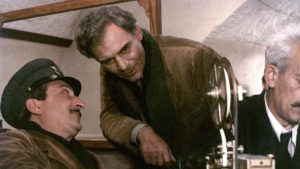STUDIO: Criterion Collection | DIRECTOR: Francesco Rosi | CAST: Gian Maria Volontè, Paolo Bonacelli, Alain Cuny, Lea Massari, Irene Papas, François Simon
RELEASE DATE: 9/22/20 | PRICE: DVD $22.99, Blu-ray $27.99
BONUSES: interview with translator and author Michael F. Moore; 1978 documentary on Italian political cinema; excerpt from a 1974 documentary featuring Francesco Rosi and author Carlo Levi; excerpt from Marco Spagnoli’s short 2014 documentary “Unico”
SPECS: NR | 220 min. | Foreign language drama | 1.33:1 | monaural | Italian with English subtitles
The most memorable sequences in Francesco Rosi award-winning 1979 film Christ Stopped at Eboli occur in the first half, where the protagonist, author-painter Carlo Levi (Gian Maria Volontè, A Fistful of Dollars, Investigation of a Citizen Above Suspicion), walks through the mountain village he’s been exiled to by the Italian fascist government. Levi learns about the villagers’ culture as he walks, encountering old traditions and superstitions and being welcomed by the villagers.
The results are a fascinating series of sights and sounds that will remain with viewers long after they have forgotten the nuances of the fact-based plot, and the political debates that comprise a good deal of the second half of the film.
The length of Eboli is indeed both an advantage and a drawback. Based on the critically lauded 1945 book by Levi about his experience being “imprisoned” in the village for over a year in the mid-1930s, as a result of his anti-fascist activities, Eboli was coproduced by the Italian network RAI, and so both a theatrical cut of the film (running 150 mins) and a four-part television miniseries version — released here for the first time in the U.S. — were prepared. The TV version allows the gorgeous village scenes to last longer, as well as the lamentably didactic political discussions.
The manner of Levi’s imprisonment is surprising for modern-day viewers — it certainly is a form of punishment for a big-city intellectual to be deprived of urban luxuries and freedom of mobility, but a government exiling its political radicals to rural villages is an odd form of punishment. (Levi later served in an actual jail during WWII, so he experienced both the more lenient and very rigid forms of imprisonment.)
Once one accepts that curious (but fact-based) aspect of the plot, one can settle down and be enchanted by Rosi and cinematographer Pasqualino De Santis’ absolutely beautiful evocations of the mountain village, and the wonderfully acted (by a mixture of professional and non-professional performers) scenes in which Levi serves as the audience’s surrogate, learning about his new neighbors and their old-fashioned lifestyles.
The pace changes when Levi receives his first visitor (his sister, played by Lea Massari) and has a private political discussion with the village’s mayor (Paolo Bonacelli). From that point on, the script by Rosi, Tonino Guerra and Raffaele La Capria imparts a very clear message about the way that sophisticated Northern Italians looked down on those in the south of the country.
The imbalance between the first two episodes and the latter two does not dispel the beauty of the imagery and the strength of the performances. Alain Cuny (playing a very pious land owner) and Irene Papas (as a villager hired as Levi’s servant) have scene-stealing moments, but Volontè is superb throughout. As was the case in so many Italian films made during and after the Neo-realist period, the faces of the villagers here are stunningly authentic.
He beautifully conveys the contradictory emotions that Levi experiences, especially when the villagers find out that he is a medical doctor. (Levi had graduated medical school but had never adopted a practice, pursuing writing and painting instead.) Volontè had a history of appearing in Left-wing film projects and so it was natural that he appeared in Eboli, in which Rosi wanted to explore what was called “the Southern problem.” (The notion that the Italian government had abandoned rural Southerners.)
The most helpful of the onscreen supplements included here is an interview with translator and author Michael F. Moore, who knew Rosi and wrote the subtitles for this edition of Eboli. Moore provides essential info about Levi and the book that the film was based on — which, Moore says, was considered “nostalgic” and “too centrist” by 1979. He also discusses the many regional dialects heard in the film and notes which scenes contained those dialects.
Most interesting is his linking Eboli to The Conformist (Levi’s main collaborator in anti-fascist activities was the character killed at the end of Bertolucci’s classic) and Pasolini’s The Gospel According to St. Matthew (the location chosen for Eboli was Matera, the same village used by Pasolini for his film).
A 1974 dual interview with Rosi and Levi from French TV finds them discussing the ways in which Southern Italians “weren’t considered human” by the government. Rosi also speaks glowingly about Levi, whom he considers one of his two artistic “fathers,” along with Luchino Visconti (whom he assisted on several films).
A short 1978 French documentary on the making of political films in Italy features interviews with Rosi, Elio Petri and Volontè. Here Rosi speaks eloquently about “the Southern problem” and posits that the political turmoil that pervaded Italy in the Seventies “would take time” to reach the screen, as artists processed how to address those events in the form of dramatic films.
A last excerpt, containing Rosi’s final onscreen interview, comes from a short called “Unico,” about Volontè. Rosi maintains that it took six months for Matera to be rebuilt as the mountainous village that Levi was exiled to in the Thirties. He also discusses Volontè’s dedication to his craft, noting that the actor committed scripts to memory by rewriting them by hand three or four times before shooting began.
|
Buy or Rent Christ Stopped at Eboli
|
|---|
 | Audio
| Audio 
Leave a Reply